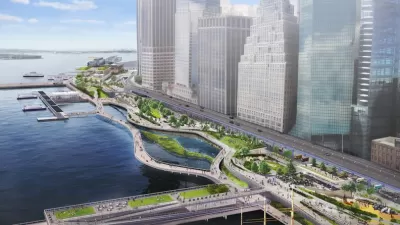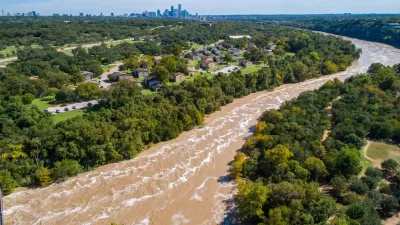The public sector and the private sector need a better system of incentives to deliver on the infrastructure and development investments necessary to prepare for climate change and other environmental threats.

"Many cities are turning to other partners to work on their resiliency efforts," according to an article by Jackie Snow. Other partners, that is, meaning the private sector.
However, much of the article focuses on the remaining disconnect between the public sector and the private sector on the work remaining to be done to build resilience—not just resilience plans. Ernst & Young and 100RC released a study called "How can cities build resilience thinking into their infrastructure projects?" for instance, "found that city governments think they understand the challenges of urban resilience better than they actually do, with only 30% of private sector agreeing that cities understand the work around urban resiliency."
The disconnect is perpetuated like challenges like term limits (politicians are interested in wins during their tenure, not in thinking on the timelines of climate change) and project budgets (private sector entities are afraid of overbidding on requests for proposals. In fact, the "study found that both the public and private sector agree there is insufficient incentives to incorporate resilience thinking into infrastructure," according to Snow.
FULL STORY: The role of P3s in resilience planning

Alabama: Trump Terminates Settlements for Black Communities Harmed By Raw Sewage
Trump deemed the landmark civil rights agreement “illegal DEI and environmental justice policy.”

Planetizen Federal Action Tracker
A weekly monitor of how Trump’s orders and actions are impacting planners and planning in America.

How Atlanta Built 7,000 Housing Units in 3 Years
The city’s comprehensive, neighborhood-focused housing strategy focuses on identifying properties and land that can be repurposed for housing and encouraging development in underserved neighborhoods.

In Both Crashes and Crime, Public Transportation is Far Safer than Driving
Contrary to popular assumptions, public transportation has far lower crash and crime rates than automobile travel. For safer communities, improve and encourage transit travel.

Report: Zoning Reforms Should Complement Nashville’s Ambitious Transit Plan
Without reform, restrictive zoning codes will limit the impact of the city’s planned transit expansion and could exclude some of the residents who depend on transit the most.

Judge Orders Release of Frozen IRA, IIJA Funding
The decision is a victory for environmental groups who charged that freezing funds for critical infrastructure and disaster response programs caused “real and irreparable harm” to communities.
Urban Design for Planners 1: Software Tools
This six-course series explores essential urban design concepts using open source software and equips planners with the tools they need to participate fully in the urban design process.
Planning for Universal Design
Learn the tools for implementing Universal Design in planning regulations.
Jessamine County Fiscal Court
Caltrans
Institute for Housing and Urban Development Studies (IHS)
City of Grandview
Harvard GSD Executive Education
Toledo-Lucas County Plan Commissions
Salt Lake City
NYU Wagner Graduate School of Public Service





























